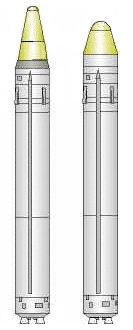Strela (rocket)
Strela (Russian: Стрела, arrow) is a Russian orbital carrier rocket, derived from the Soviet/Russian UR-100NU missile. It conducted its maiden test launch on 5 December 2003, carried its first functional payload on 27 June 2013,[12] and a second one on 19 December 2014.[13]
 The Strela carrier rocket | |
| Function | Orbital carrier rocket |
|---|---|
| Manufacturer | NPO Mashinostroyeniya, JSC "Khartron", Ukraine (control system)[1] |
| Country of origin | Russia |
| Size | |
| Height | 28.3 metres (93 ft)[2] |
| Diameter | 2.5 metres (8.2 ft)[2] |
| Mass | 105,000 kilograms (231,000 lb)[3] |
| Stages | 2 |
| Capacity | |
| Payload to LEO | 2,000 kilograms (4,400 lb)[3] |
| Associated rockets | |
| Family | Universal Rocket |
| Launch history | |
| Status | Active |
| Launch sites | Baikonur Cosmodrome |
| Total launches | 3 |
| Successes | 3 |
| First flight | 5 December 2003 |
| First stage | |
| Diameter | 2.5 m (8.2 ft)[4] |
| Engines | 3 RD-0233 (15D95) 1 RD-0234(15D96)[5][6] |
| Thrust | 2,080 kN (470,000 lbf)[7][8] |
| Specific impulse | 310s[7] |
| Burn time | 120 seconds |
| Fuel | N 2O 4 / UDMH |
| Second stage | |
| Diameter | 2.5 m (8.2 ft)[4] |
| Engines | 1 RD-0235 (15D113) 1 RD-0236 (15D114)[5][6] |
| Thrust | 255.76 kN (57,500 lbf)[9][10] |
| Specific impulse | 310s[9] |
| Burn time | 180 seconds |
| Fuel | N 2O 4 / UDMH |
| Third stage – APB (Agregatno-Priborny Otsek)[2] | |
| Engines | 1 RD-0237[11] |
| Thrust | 4.90 kilonewtons (1,100 lbf)[11] |
| Specific impulse | 200 s sec[11] |
| Fuel | N 2O 4 / UDMH |
| External images | |
|---|---|
Strela was originally planned to be launched from the Svobodny Cosmodrome, with test launches being conducted from existing UR-100 silos at the Baikonur Cosmodrome. Svobodny was closed in 2007, without seeing any Strela launches. It is unclear whether a Strela launch complex will be incorporated into the Vostochny Cosmodrome, which is being built on the site of Svobodny.
Strela differs from the Rockot, which is also derived from the UR-100, in that it has undergone fewer modifications, such as the absence of an additional Briz-KM upper stage, as used on the Rockot. However it is equipped with a repurposed APB as upper stage, which was designed to deliver nuclear warheads. It is also launched from silos, whereas the Rockot is launched from flat pads.
Launch history
| Date (UTC) | Type | Launch site | Payload | Payload type | Outcome |
|---|---|---|---|---|---|
| 5 December 2003, 06:00 | Strela | Ba LC175 | Gruzomaket | test launch | Success |
| 27 June 2013, 16:53 | Strela | Ba LC175 | Kondor | research satellite | Success |
| 19 December 2014, 04:43 | Strela | Ba LC175 | Kondor-E | research satellite | Success |
See also
- Comparison of orbital launchers families
- Comparison of orbital launch systems
- Dnepr rocket
References
- "Control systems for intercontinental ballistic missiles and launch vehicles". JSC "Khartron". Archived from the original on 2010-02-05.
- Zak, Anatoly. "Strela launcher". RussianSpaceWeb.com. Retrieved 2015-06-19.
- Wade, Mark. "Strela". Encyclopedia Astronautica. Retrieved 2015-09-03.
- Zak, Anatoly. "UR-100N Family". RussianSpaceWeb.com. Retrieved 2015-06-19.
- "RD-0233, RD-0234, RD-0235, RD-0236, RD-0237. Intercontinental ballistic missiles RS-18". KBKhA. Retrieved 2015-06-19.
- "Rockot Launch Vehicle". Khrunichev State Research and Production Space Center. Retrieved 2015-06-19.
- Wade, Mark. "RD-0233". Encyclopedia Astronautica. Archived from the original on 2015-08-24. Retrieved 2015-06-19.
- Wade, Mark. "RD-0234". Encyclopedia Astronautica. Archived from the original on 2015-08-24. Retrieved 2015-06-19.
- Wade, Mark. "RD-0235". Encyclopedia Astronautica. Archived from the original on 2015-08-24. Retrieved 2015-06-19.
- Wade, Mark. "RD-0236". Encyclopedia Astronautica. Archived from the original on 2015-08-24. Retrieved 2015-06-19.
- Wade, Mark. "RD-0237". Encyclopedia Astronautica. Archived from the original on 2015-08-24. Retrieved 2015-06-19.
- Graham, William. "Russian Strela rocket launches Kondor satellite". NasaSpaceFlight.com. Retrieved 27 June 2013.
- Graham, William. "Russian Strela rocket launches Kondor-E". NasaSpaceFlight.com. Retrieved 19 December 2014.